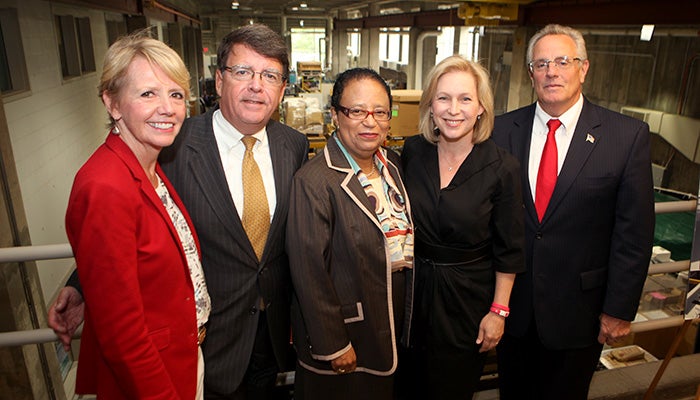
(l-r) Linda Hillman, president of the Rensselaer County Regional Chamber of Commerce, Michael Tucker, president of the Center for Economic Growth, Rensselaer President Shirley Ann Jackson, U.S. Senator Kirsten Gillibrand, and Troy Mayor Lou Rosamilia at the MILL.
Joined by Rensselaer President Shirley Ann Jackson and other campus leaders, U.S. Sen. Kirsten Gillibrand toured the Rensselaer Manufacturing Innovation Learning Laboratory (MILL) and parts of the Center for Automation Technologies and Systems (CATS) on July 21 to see an example of the data-driven transformations underway and to announce new legislation for helping translate academic research into new products and businesses. The leading-edge facilities are located in the Low Center for Industrial Innovation.
“Rensselaer has long been a leader in incubating new ideas and companies that arise from university-based education and research,” President Jackson said. “As Senator Gillibrand saw today, we are positioning our students and New York State companies to tap the entrepreneurial opportunities that are emerging from advances in manufacturing.”
Guided by The Rensselaer Plan 2024, we intend to be transformative in three fundamental ways: in the global impact of our research, in our innovative pedagogy, and in the lives of our students.”–President Jackson
At the MILL, Gillibrand saw firsthand how Rensselaer students in the two-semester, senior-level Manufacturing Processes and Systems class work to conceive, develop, and manufacture interesting products.
“The work being done here at Rensselaer is extraordinary,” Senator Gillibrand said. “When I see this much talent, innovation, and vision, I know we can have a thriving economy. Not just for this generation, but for many generations to come.”
 Led by Dean of Engineering Shekhar Garde, the tour included stops at two CATS laboratories. The composites manufacturing lab develops new, innovative manufacturing processes and modeling tools for small- and mid-sized companies, helping to significantly reduce product cost and production lead time. The industrial automation lab is dedicated to developing solutions to manufacturing and assembly challenges that are beyond the capabilities and expertise of traditional automation companies. CATS Director Dan Walczyk and MILL leader Sam Chiappone helped lead sections of the tour as well.
Led by Dean of Engineering Shekhar Garde, the tour included stops at two CATS laboratories. The composites manufacturing lab develops new, innovative manufacturing processes and modeling tools for small- and mid-sized companies, helping to significantly reduce product cost and production lead time. The industrial automation lab is dedicated to developing solutions to manufacturing and assembly challenges that are beyond the capabilities and expertise of traditional automation companies. CATS Director Dan Walczyk and MILL leader Sam Chiappone helped lead sections of the tour as well.
During the tour, President Jackson told the senator about the Institute’s plan to improve and expand the MILL, toward the goal of educating, inspiring, and challenging students to become the next generation of manufacturing leaders and entrepreneurs.
“Guided by The Rensselaer Plan 2024, we intend to be transformative in three fundamental ways: in the global impact of our research, in our innovative pedagogy, and in the lives of our students,” President Jackson said. “As the ‘New Polytechnic’ we intend to address societal challenges and opportunities through interdisciplinary collaboration and data-driven decision-making. The deluge of data and advances in computation are revolutionizing a vital sector to which Rensselaer has contributed technological innovations and a brilliant workforce throughout its history: advanced manufacturing. This includes nano- and micro-scale manufacturing, Big Data collection, high-speed manufacturing, advanced robotics, advanced composites, and additive manufacturing.”
 During her visit, Gillibrand introduced the bipartisan Technology and Research Accelerating National Security and Future Economic Resiliency (TRANSFER) Act. The bill aims to create a competitive grant program for universities, federal laboratories, and nonprofit research institutions that would help researchers secure the skills and resources to commercialize promising new technologies, found companies, and–ultimately–create jobs. Rensselaer Vice President for Research Jonathan Dordick, who is also the founder of biochip maker Solidus Biosciences Inc., delivered remarks and praised the proposed TRANSFER Act at the press conference following the tour.
During her visit, Gillibrand introduced the bipartisan Technology and Research Accelerating National Security and Future Economic Resiliency (TRANSFER) Act. The bill aims to create a competitive grant program for universities, federal laboratories, and nonprofit research institutions that would help researchers secure the skills and resources to commercialize promising new technologies, found companies, and–ultimately–create jobs. Rensselaer Vice President for Research Jonathan Dordick, who is also the founder of biochip maker Solidus Biosciences Inc., delivered remarks and praised the proposed TRANSFER Act at the press conference following the tour.
“This is really fantastic legislation, because we’re really being a champion for what we do – not just at a technological university, but at any major research university – which is to move our ideas from the fundamental stage all the way to commercialization, so they can impact society directly,” Dordick said.
Under the TRANSFER Act, five federal agencies, including the Department of Defense, the Department of Energy, Health and Human Services, NASA, and the National Science Foundation, would establish a competitive grant program to help universities, federal laboratories and other non-profit research institutions identify and grow the development and commercialization of initial discoveries, making potential products more attractive to state, local, and private investment.


